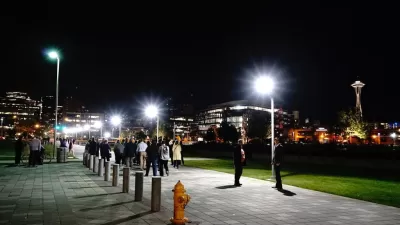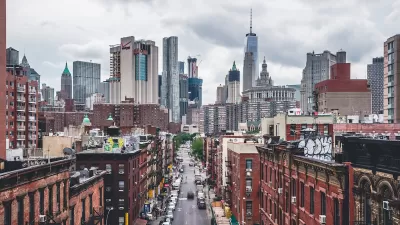As the presidential election season gears up, Mortimer B. Zuckerman's op-ed offers a cynical and weary electorate hope by invoking a transformative political vision of the role of the city.
For those unfamiliar with Bruce Katz and Jennifer Bradley’s 2013 book, The Metropolitan Revolution, the Editor-in-Chief of U.S. News & World Report offers a renewed rally cry.
"Leading metropolitan areas are more or less on their own since the federal government is in deep freeze," Mortimer B. Zuckerman states. He zeros in on partisan gridlock in Washington to explain why cities are assuming leadership in areas that were once the purview of the federal government, building the infrastructure and welcoming the communities that create the innovation clusters that drive 21st century economic development.
"Similar to the Tea Party and the Occupy movements, the metropolitan revolution is a child of the Great Recession," Katz and Bradley write. "Yet it is reasoned rather than emotional, leader driven rather than leaderless, born of pragmatism and optimism rather than despair and anger."
Unlike far-removed Washington politicians focused on two-year election cycles, city leaders plan for the long haul and "live daily with the consequences of their decisions," writes Zuckerman.
"The metropolitan revolution has only one logical conclusion: the inversion of the hierarchy of power in the United States," predict Katz and Bradley. They go so far as to write, "There is, in essence, no American (or Chinese or German or Brazilian) economy; rather, a national economy is a network of metropolitan economies."
While this outcome may seem alarmingly pre-Westphalian, the Brookings Institution authors point out that such a turn honors the ingenious nature of our political system.
"But what is happening in the United States today is also rooted in timeless and quintessential American values and is uniquely aligned with the disruptive nature of this young century and the manner and places in which people live their lives. The emerging revolution is not just a cyclical reaction but also a structural shift."
FULL STORY: The New American Heartland

Planetizen Federal Action Tracker
A weekly monitor of how Trump’s orders and actions are impacting planners and planning in America.

Restaurant Patios Were a Pandemic Win — Why Were They so Hard to Keep?
Social distancing requirements and changes in travel patterns prompted cities to pilot new uses for street and sidewalk space. Then it got complicated.

Map: Where Senate Republicans Want to Sell Your Public Lands
For public land advocates, the Senate Republicans’ proposal to sell millions of acres of public land in the West is “the biggest fight of their careers.”

Maui's Vacation Rental Debate Turns Ugly
Verbal attacks, misinformation campaigns and fistfights plague a high-stakes debate to convert thousands of vacation rentals into long-term housing.

San Francisco Suspends Traffic Calming Amidst Record Deaths
Citing “a challenging fiscal landscape,” the city will cease the program on the heels of 42 traffic deaths, including 24 pedestrians.

California Homeless Arrests, Citations Spike After Ruling
An investigation reveals that anti-homeless actions increased up to 500% after Grants Pass v. Johnson — even in cities claiming no policy change.
Urban Design for Planners 1: Software Tools
This six-course series explores essential urban design concepts using open source software and equips planners with the tools they need to participate fully in the urban design process.
Planning for Universal Design
Learn the tools for implementing Universal Design in planning regulations.
Heyer Gruel & Associates PA
JM Goldson LLC
Custer County Colorado
City of Camden Redevelopment Agency
City of Astoria
Transportation Research & Education Center (TREC) at Portland State University
Camden Redevelopment Agency
City of Claremont
Municipality of Princeton (NJ)





























